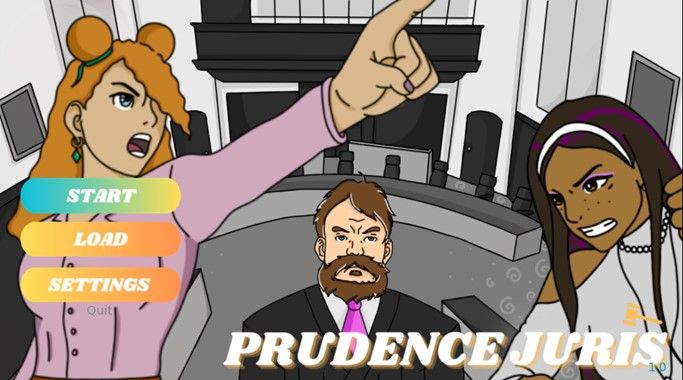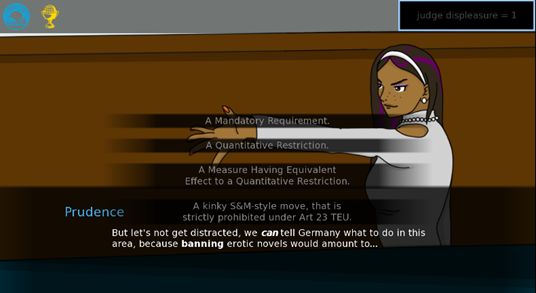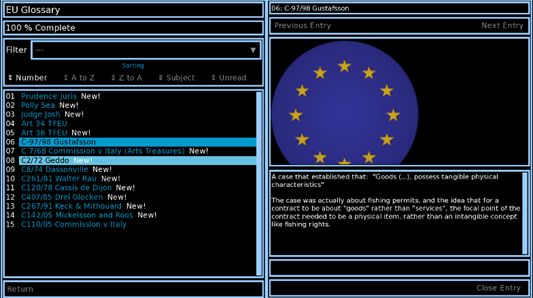Prudence Juris: School of Law academic designs video game to help students learn

Dr Josh Warburton uses creative methods to help students with European Union law.
Dr Warburton, lecturer in the School of Law, noted that sometimes legal topics could seem too theoretical and detached from student's lives to seem relevant, so he decided to remedy this. He says:
“I wanted to create something that allowed students to engage with topics on a more personal level.”
The result was a video game, Prudence Juris, designed to teach application of legal ideas, specifically in relation to the Law of the European Union. The game reacts to the players’ choices and gives immediate feedback when a player selects something that is either incorrect or irrelevant in the circumstances.
An innovative teaching method

Start screen of the video game Prudence Juris.
The biggest advantage of this style of teaching method is that it allows the student to understand the context of rules and principles, whilst providing entertainment.
He explains how he uses it as a teaching tool:
“I demonstrate the game in a lecture very briefly, with instructions on how to download it, and then I get students to complete scenarios before seminars as it allows them to engage with how that topic works in practice.”

A scene from the game depicting a dialogue choice.
In addition to the main game mechanics, the game also features a built-in menu that allows players to check specific legal cases and legislation; meaning that the player does not need to leave the game to find the answers.

Built-in menu to check legal cases and legislation.
I love games of all types and have a big library of board games and video games. Technically, making games isn’t part of my job description, but I feel like I’ve always learned a lot from the video games I’ve played; so making it was both worthwhile for students, and fun for me. Before I became a lecturer, I was a double bass player, so I think I always need some kind of creative outlet anyway – and making video games requires a lot of different creative skills.
The techy bit
The game was programmed using the ren'py as the game engine, and is primarily coded using the Python programming language. As Dr Warburton wanted others to be able to create scenarios for the game as easily as possible in the future, he created detailed notes in the code that explains where you would need to place text (and what lines of text do) so that it can be easily repurposed with minimal coding knowledge. The game is accessible as a downloadable file on Minerva and works on both PC and Mac.
“Super duper helpful”
Student response to the game was collected via an optional Microsoft Forms document, which asked the participants to comment on different aspects of the game and rank the game out of 10. Responses were universally positive, with students rating it at 9.22/10 on average, with comments claiming:
“This is the best invention ever! 10000/10. Made learning so fun!”
“Please make more of these Pls It was super duper helpful. Wish all modules made them.”
“Helped me understand what it would be like actually coming up with counter-arguments in a case.”
Dr Warburton responds to this feedback by saying:
I think video games provide an informal space where it's easy to understand something from a different perspective, and it allows me to bring a bit of humour into the process of learning - which I think is always valuable.
The intention is to make the source code available to anyone who wants to build upon it, and I’ve had some interest in this after presenting the video game for the LEGEND group. I’ve also written a chapter about the video game for the upcoming How To Apply Game Based Learning in Legal Education book to be published by Elgar Publishing.
Dr Warburton is the Deputy Director of the Centre for Innovation and Research in Legal Education.




